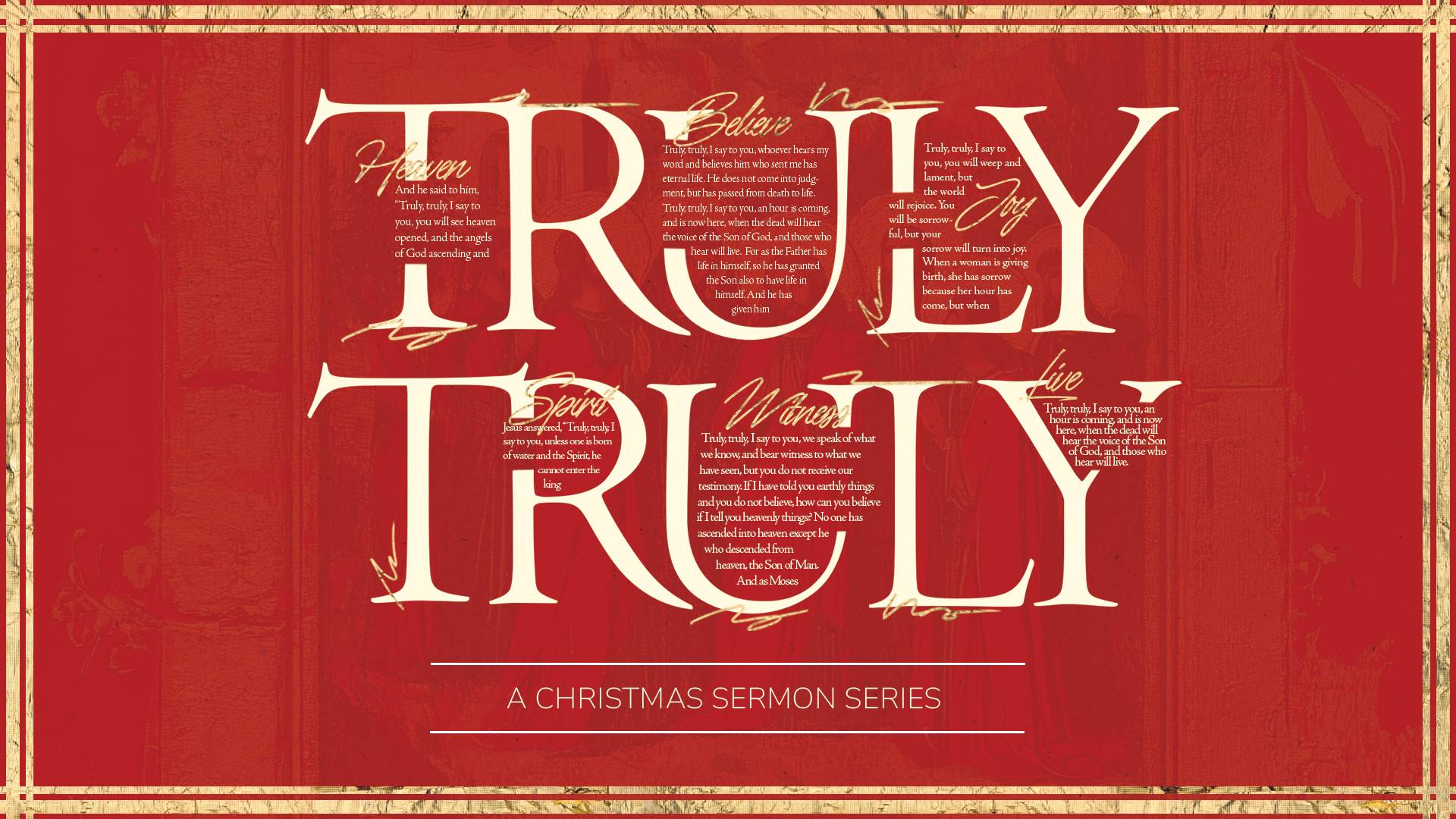In This Series
Appointing Elders
Titus 1:4-9 (ESV)
February 13, 2022
Dr. Ritch Boerckel
We’re in a new study in the book of Titus. As you can see on our banners, we’ve entitled this Order In A World Of Chaos. Do you experience chaos in this world? Have you ever had that chaos sometimes seep into the church? That doesn’t ever happen, does it? We’re going to talk about order in a world of chaos and how we have this precious privileged position that God has granted us of being redeemed, zealous for Him, and purified. We’re clean. So we’re going to be looking at verses 4-9 of Titus chapter 1.
4 To Titus, my true child in a common faith: Grace and peace from God the Father and Christ Jesus our Savior. 5 This is why I left you in Crete, so that you might put what remained into order, and appoint elders in every town as I directed you—6 if anyone is above reproach, the husband of one wife, and his children are believers and not open to the charge of debauchery or insubordination. 7 For an overseer, as God’s steward, must be above reproach. He must not be arrogant or quick-tempered or a drunkard or violent or greedy for gain, 8 but hospitable, a lover of good, self-controlled, upright, holy, and disciplined. 9 He must hold firm to the trustworthy word as taught, so that he may be able to give instruction in sound doctrine and also to rebuke those who contradict it.
May God encourage us through His Word, this morning!
Recently, my four year old grandson began his first journey into the world of jigsaw puzzles. Opening the box, I poured all the pieces out onto the table. Remarkably, when the pieces fell out haphazardly from the box, they formed themselves and they fit together all on their own into the picture that was right here on the box. Isn’t that amazing? No, that didn’t happen! (Laughter!) That never happens. They fell out into this big, messy pile. I told Malakai that our job then was to put these jumbled pieces together and when we did, they would form this picture of this majestic ship on the front. Malakai looked at me puzzled by the whole thing. (Laughter!)
So I encouraged him by saying, “Let’s begin.” First, let’s turn over all the pieces to the colored sides, the sides where the picture is presented. Then I told him to look for pieces with a flat edge. I told him these are the edge pieces and when we find a piece with a flat edge, we’re going to set it aside over in this corner. I told him to also look for pieces with red in it. Those pieces are part of the sail and they’re going to help us to identify how to put this puzzle together. All the pieces eventually were turned and separated. We began with the edges of the puzzle to piece together the border. I encouraged him to look at the box to see if he could find where any of those pieces might fit around the frame of the picture. It took some time for him to get the hang of everything, but eventually, he experienced the joy of fitting some of those pieces together. At the end of this project, his face just lit up with glee as all the pieces that were once this big chaotic mess were now fitted together, forming this ship of beauty and interest.
When God created the world, He created it with order. He created it with harmony and purpose and beauty. Everything in God’s good creation worked the way it was supposed to work. It worked with the intended purpose for which it was made. Then sin crashed into this world and chaos shattered the order everywhere. The chaos shattered the order of man’s relationship with God so that now Adam and Eve hid in terror from God. The chaos shattered man’s soul so that where there was once a purity, there was once an innocence, now shame and guilt prevailed.
The chaos shattered oneness in the marriage that God Himself established. Now Adam and Eve, in fear of vulnerability, covered themselves out of protection from one another. The chaos shattered man’s honesty as they searched for other solutions to their problem of shame. Those solutions were defensive lies that forsook confession of what is true and right. The chaos shattered harmony among the animals so that the powerful beasts drank the blood of the weak. The chaos shattered beauty and fruitfulness in the garden so that now thorns infested the ground. The chaos shattered true worship as Cain refused to bring a sacrifice that was acceptable to God. The chaos shattered this first family as an embittered brother crushed the skull of innocent Abel. Disorder, conflict, confusion, isolation, brokenness, guilt, frustration, pain, these are now everywhere. There is no place in God’s creation where man could escape the ugly chaos that is now present.
Just as my grandson would have grown frustrated and made no progress with this big pile of unruly puzzle pieces apart from a grandpa’s intervention, so too, man without God’s direct intervention is absolutely helpless to put the pieces of life and society together. All the king’s horses and all the king’s men absolutely cannot put Humpty Dumpty back together again. Here’s the truth that we’re going to discover throughout this section and really, we discover throughout the whole of the Bible. No order exists in the world’s chaos without God’s gracious, divine intervention. If we wish to live life without God, we wish ourselves into an eternity of chaos. If we wish for order in our life, we must humble ourselves before God and receive His grace because it’s only His grace that can set things back right again.
Through the Gospel, God offers the hope that the soul damaging chaos that we experience in this world would find remedy. Through the Gospel, God offers us deliverance from painful condemnation that our sin merits. It’s through the Gospel that God offers reconciliation into a restored relationship with His very Person. It’s through the Gospel that God offers us a whole new community where conflict will not endure and where peace rules. It is through the Gospel that God offers us an eternal purpose to work toward, a fruitful life.
At the heart of God’s work of bringing order into the world is His saving plan for His church. It’s rooted in the work and Person of Jesus Himself. Through Jesus’ death and resurrection, God designs for His own redeemed people to enjoy order right in the middle of a world of chaos. We cannot experience order apart from Jesus. But through Jesus, we can and we will. We cannot participate in Jesus’ work of bringing order to this world apart from our connection to His church. It is His church that is to be the place in which order rules and reigns.
The main idea we’re going to track through Titus chapter 1 is that Jesus works through His church to bring His good order into a world of chaos. God calls qualified leaders or elders to lead Jesus’ church so that together we would be a people of order and a purveyor of order, a means by which order begins to flow into the world through the Gospel. As we look specifically at this role that God has established for elders, we first want to consider
The Purpose of Elders
Right away, we’re introduced to government within God’s own people. God designs government for good. Governments often can become purveyors of evil and chaos, but within the church, God intends for there to be a means by which there is leadership, in which there is shepherding, there is help to the church. We find God’s plan right away in verse 5.The Apostle Paul says to this young spiritual leader whose name is Titus and is a Gentile convert,
5 This is why I left you in Crete, so that you might put what remained into order, and appoint elders in every town as I directed you—
It is likely that Titus feels a bit discouraged by having been left in Crete and that’s why Paul wants to infuse him with encouragement, with strength that there is a purpose why he is left there. Titus has traveled around with Paul as one of the team members and he has enjoyed Paul’s presence. He has enjoyed the ministry. Now he is left behind. The team moves forward, but Paul leaves Titus behind on this island of Crete. He says, “Titus, I did this not to make life hard for you, but so that you would put into order what remains.” He says, “Titus, I am giving you a very special assignment. I’m asking you to lead this church on the island of Crete, through some really, really big problems.”
God has established a new society on Crete through salvation and this church in Crete was a genuine church, a people who had been redeemed, a people who had been purified by the blood of Jesus Christ. But what appears to happen is that this is a church with problems. You see, Crete and its culture was a very worldly place. It was filled with sexual immorality, filled with greed and lazy living. This fairly new church in Crete is filled with young converts who still struggle with the sins of the past, the sins of the culture. These sins engaged in by believers, are allowing the chaos of the world to invade in the church. Some spiritual life remains in this church, but the church itself needs help. So Paul appoints Titus, a spiritually mature young man, as a spiritual leader in this church, in order to put into order, spiritual order, what remains.
Keep in mind that order is what the church is supposed to experience as it submits itself under God’s good rule. Chaos is what the church experiences when it rejects or rebels against God’s good rule. So Titus is given to this church to help put into order the things that remain. In this present age, the blessing of divine order is constantly challenged by the chaos of sin, by the chaos that Satan would bring, and by the chaos of self-centered attitudes. All the way until the day Jesus comes, there is going to be the threat of chaos entering into the very place where order is to be the order of the day.
So how is it that God is going to establish order in this church that has become chaotic? Well, every member in a church is responsible to some degree for the order that exists in his or her own local assembly. Every member is right to ask himself or herself this question: How is my own church healthier as the result of my involvement in her? This is a baseline question for a follower of Jesus Christ. This is not a question that you get to after Year One or Year Two of spiritual growth, maturing to eventually ask, “how is my own church healthier, more in order as a result of my presence?” No, this is simply the very ground from which we follow Jesus.
If you are redeemed, if you have been purified by the blood of Jesus Christ and you are a member of Jesus’ church, God has placed you there with specific gifts and with faith so that your gifts and your faith would have a positive impact upon the church. So if you’re thinking about this question and saying, “I don’t know if I can answer it,” that is a very serious matter. Right away, as this question is asked, as a member of Jesus’ church, you should be able to identify very specifically, some ways in which your presence, your involvement, your commitment, your faith is being used to make your own local church healthier, stronger, more in order. Now, here in Titus 1, God places special emphasis on the role of elders in bringing order to the church.
5 This is why I left you in Crete, so that you might put what remained into order,
Right away, following that without skipping a beat, Paul says
and appoint elders in every town as I directed you—
Part of the way in which Titus is to put order into the churches in these towns is to appoint elders in every church in every town. God gives Jesus’ church spiritual leaders to help the church be all that the church should be and is designed to be. God designs for order to push back against the chaos through the healthy shepherding of elders in each local church.
At Bethany, the elders have identified some key areas where God is calling us to bring order to our church. We believe first that God would have us build a stronger care ministry where members who are in the church who have physical, emotional, relational, or spiritual needs, will find encouragement, support, and help from the church family. Having needs without any kind of support is chaos. We pray that our new Care Ministry will be used of God to bring greater order to this need.
We believe, second, that God would have us build a greater connection and community among every member in our church family. Too many members feel disconnected from their brothers and sisters. Too many come to church and they feel isolated and lonely. Isolation is a kind of chaos. We pray that God would bind us together so that we share our hearts and share our lives with one another for the glory of God. We pray that this wouldn’t just be a place to come to for a worship service, but that this would be a family, a people to belong to, where we love others and we are loved by our brothers and sisters. So our renewed Welcome Ministry and our Community Group ministry are key initiatives from the elders toward this goal.
We believe that God would have us build stronger engagement with Jesus’ mission of proclaiming the Gospel to the world. Too many members in the church are disconnected from Christ’s mission and are not being light and salt in the world. Too few in our community have heard the Gospel explained to them. Hiding our light under a bush invites unbelievable chaos in the world.
We believe that God would have us focus on spiritual growth as we follow Jesus in discipleship. Too many members are still floundering in their walk with Christ and not growing into the likeness of Christ through conformity to Jesus. Immature and sinning members invite chaos into their own lives and into the life of the church family.
God calls shepherds to come alongside members to feed God’s sheep the Word of God, the Gospel of God. He calls shepherds to protect the sheep against wolves who teach false doctrines, to warn and instruct. He calls shepherds to bind up wounds when sin cuts into the soul. He calls shepherds to seek sheep who are wandering and help them return to the faith. All this is part of the elder’s work of discipleship. All this is part of the elder’s purpose of bringing order into what remains. God calls elders in our church family to put all of these weaknesses and others into order.
What are some applications? The first application I would encourage you toward is to pray for those whom God has appointed as spiritual leaders in your own church family. Their work is often hard and discouraging. I would urge you to love your elders by thanking God for them and by asking God to bless them with faith and wisdom and endurance and courage. Pray for them.
Secondly, I would encourage you to make our spiritual leadership’s labor a joy as they willingly commit themselves to God’s calling. How do we do that? I think Hebrews is most profound. God says
Hebrews 13:17 Obey your leaders and submit to them, for they are keeping watch over your souls, as those who will have to give an account. Let them do this with joy and not with groaning, for that would be of no advantage to you.
There is a way to interact with the church family and with spiritual leadership that brings joy to them. Even in the midst of some struggles and trials, it’s a joy. There is a way to interact with the church and with God and with spiritual leadership in a way that brings groaning. “This is just hard!”
Finally, ask yourself, “How am I making my own local church more healthy and to experience more order from the Lord?” So that’s the purpose of the elders. It’s the big picture. Now we want to talk about
The Appointment of Elders
In all the Bible, we don’t find a chapter or a passage that answers the question, “How exactly are elders appointed in the church?” We have some helpful instructions about this process, but there is no manual that gives the details. For this reason, there are some really, really good churches who have very different policies and practices in regards to the appointment of elders.
Here in Titus 1, God tells Titus to simply appoint elders in every city. In other passages, it does seem as though the congregation has some voice in the selection of some leaders. I think of Acts 6 where there were some spiritual leaders needed to attend to the Hellenistic widows’ needs. The congregation is involved in the selection of these seven men. I think of Acts 13, where Paul and Barnabas are sent out and the congregation has some involvement in sending them out from their midst onto that first missionary journey. So it seems that the whole congregation has some part in the process of making big decisions regarding leadership.
But again, I would still highlight the description in our passage here that one godly leader, Titus, appoints elders in every city. Yes, Titus’ role is unique here at this point in time. He is acting as a very special delegate to the apostle Paul, who possesses absolute authority underneath Jesus within the church. So we are right to be cautious about imitating this particular pattern. But again, in this passage, there is no mention of the congregation’s involvement in the appointment of elders. A principle that I would draw is that Godly church leaders are used by God to appoint other godly men whom God has called to the role of elder in the local church.
It is important to note however, that Titus is not said to call elders to the ministry of shepherding. He is simply to appoint men whom God has already called. No person can call themselves into eldership and no congregation or separate group of people can call another person into eldership in the church. God alone is the one who chooses the leadership of His church. I want to turn to Acts 20. There is something said that is really profound as Paul is meeting with the elders of the church in Ephesus. He is meeting them for the last time and giving them some parting instructions, as he is not planning to go back to Ephesus.
Acts 20:17-18 Now from Miletus he sent to Ephesus and called the elders of the church to come to him. And when they came to him, he said to them:
He’s having a last meeting. He’s giving them some instructions about how to care for the church as elders now.
Acts 20:28 Pay careful attention to yourselves and to all the flock,
In other words, he says to watch your life, that you’re walking with the Lord, representing Jesus. Then pay careful attention to the spiritual needs of the flock, of every sheep that God sends. Then he says
Acts 20:28 …in which the Holy Spirit has made you overseers,
That’s fascinating! He didn’t say, “in which you’ve decided to become an overseer.” Or “in which a council of elders made you an elder.” He says
Acts 20:28 …in which the Holy Spirit has made you overseers, to care for the church of God,
It’s God’s church. It’s not our church. It’s God’s church. He is the one who makes people into spiritual leaders.
Acts 20:28 …which he obtained with his own blood.
How does this work out practically, though? How do we know whom God selects or whom God appoints or whom God calls into ministry? Let me just tell you our process here at Bethany. Again, it’s not the one process. I just want to communicate so that we all are on the same page of how we are seeking to faithfully apply the principles we learn from God’s Word.
The first step is that the elders together identify men who we believe are spiritually qualified for this role and who we think may be called by God toward this role. We pray over these men and then we talk with them about God’s calling in their life. We ask them if they would affirm that the Lord may be calling them into this specific ministry. We include their wives as we discuss the work of shepherding in the church and the qualities necessary to fulfill this role. If the man and his wife both feel that God may be calling them into this work, we invite them into a process known as being an Elder-in-Development. We present these men who have accepted the role of being an Elder-in-Development, to the whole of the church.
There then is a twelve to twenty-four month period of time in which the church goes about in a very hands-on way, helping the individual discover what it means to have the head or mind of a spiritual shepherd, the heart of a spiritual shepherd, and the hands, the ability to do the work of spiritual shepherding. This twelve to twenty-four month period of time is important for a number of reasons. First, the man is able to grow and discover whether there is growth toward that work. If there is genuine calling, we believe there is going to be growth. Or in the process, the man may realize that he doesn’t think he is called by God and that the Lord is affirming him in this process, and he is able to do that with other men. This development phase is hands on. It’s not theoretical, so that both the candidate and his wife are able to affirm the calling of God.
But secondly, this process is helpful or important to the church because it allows church members to observe the elder candidate over a long period of time. We don’t set a person in front of you and say, “In two weeks, you have to decide.” No, this is twelve to twenty-four months and we encourage the whole of the church to say, “Would you help us to affirm this person and their calling before the Lord?” Invite them over to your home. Ask them all kinds of questions. They’re humbly placing themselves in front of the whole church to say, “Yes. This is the time to ask me hard questions. It’s time to get to know me. It’s a time where I invite your participation in affirming the call of God upon my life.”
Bethany communicates who the Elders-in-Development are in our bulletins and on our website. It’s not every week in our bulletins, but every month. The Elder-in-Development then is set before the whole church for a formal vote. We would hope that concerns would not arise right before the vote. There has been twelve to twenty-four months and we would hope that there would be some graciousness and love and attention prior to the vote that if there is a concern, that you as members would go to the person first and talk with them. If that concern is not resolved, you go to the other elders. We invite that. We think that’s important. But you see how disruptive it would be to hold onto concerns all the way until the time of the vote. It would be disruptive to the whole of the church, the individual, and everyone involved. So we would ask for twelve to twenty-four months of evaluation.
Now, if there are concerns that come up at the vote, we’re not saying don’t speak them. But we’re just saying, please, for the glory of God and for the peace of the church and the goodness of everyone involved, if you have them, get involved early rather than at the last hour. Then finally, after they’re voted on and approved by the whole of the church, the elders formally lay hands on the new elder as a sign that God is ordaining him to a lifetime of service as a shepherd in Jesus’ church.
So here’s the application for this issue of appointment. Get to know our Elders-in-Development. Ask them to your home. Pepper them with questions. If you have concerns, be bold in talking to them about your concerns. Those who are involved in the development process, again, willingly subject themselves to this kind of evaluation.
The Plurality of Elders
I really have only one observation. This part is rather short in the message. Shepherding the church is not a solo activity. God does not design for there to be a single elder in one church that works alone, without having others in that same role working with him in shepherding the flock. Here we see it says to appoint elders, plural. We saw in Acts 20 that Paul was talking to the elders in the church at Ephesus. Over and over we see the idea of a plurality of elders when they are mentioned in the New Testament.
This plurality of eldership helps free us from a number of dangers and helps us to be encouraged in a number of positive benefits. First, this plurality of elders mitigates against the threat of authoritarianism that could prevail in a leadership if one person has all that spiritual authority for the church in themselves without any others sharing. It also prevents the danger of isolation where that person becomes separated and not accountable to any other who is alongside of them in the leadership. It also helps that elder remain encouraged in times of significant spiritual battles. Those battles are many and they need to be encouraged. It provides wisdom in hard decisions so that hard decisions that are being made together would be prayed over together and then talked over together. It broadens the church’s ability to care well for souls. It’s not just one person through whom all the sheep are being fed and cared for and helped. But it provides a broader group where the care can be expanded to the number that is in the flock. It allows the Holy Spirit’s blessings to fully bless the church. If God calls more than one elder to a church, isn’t it right and a blessing to receive the person?
Right away, again, we see this word “elder.” I want to give just a brief word about it. This office is an office of spiritual leadership in the church to help the church find, discover, and grow into the order and away from chaos. This role has three names within the New Testament. It is given three titles. Right here in our own passage are two of them. It says appoint elders, but then as you notice down in verse 7, it says “an overseer.”
The word “elder” is from the Greek word presbuteros. I’m not going to give too much Greek, but it just is helpful because that’s how we get the word Presbyterian form of government. The word “overseer,” as it appears here in Titus 1 is the Greek word episkopos. We get the word Episcopalian from that Greek word. Then there is a third term that is also used to identify this same office. It’s three different terms, but one office. That is the word poimen, which means shepherd or pastor. So these three terms are not terms identifying three separate offices, but it’s the same role or same ministry. Peter uses these terms all together in this wonderful, beautiful passage in 1 Peter 5.
1 Peter 5:1 So I exhort the elders among you,
That is presbuteros.
1 Peter 5:1-2 …as a fellow elder and a witness of the sufferings of Christ, as well as a partaker in the glory that is going to be revealed: shepherd the flock of God
That’s the verb form of poimen or pastor. Pastor the flock of God
1 Peter 5:2 …that is among you, exercising oversight,
That’s the word episkopos.
1 Peter 5:2-4 …not under compulsion, but willingly, as God would have you; not for shameful gain, but eagerly; not domineering over those in your charge, but being examples to the flock. And when the chief Shepherd appears,
Elders, overseers, shepherds, pastors are under the chief Shepherd.
1 Peter 5:4 And when the chief Shepherd appears, you will receive the unfading crown of glory.
What are some applications from this idea of the plurality of elders? First, I would urge you to ask the Holy Spirit to set aside more shepherds to help us care for God’s church. Again, spiritual leadership, godly spiritual leadership, called and qualified spiritual leadership is one of the best and sweetest gifts that God gives any church. If you want a blessing, God says you have not because you ask not. Pray! Make it a point as you care for your own church family, to pray that God would send more called and qualified men into this specific office to help shepherd the church, to help put things into order, the chaos that is pressing in from the world.
Secondly, I would encourage you to aspire to be an elder. Every week, one of my great joys is to see these young men down here, and women too. There are younger men and younger women over here. It’s awesome to see that life. Praise God for your faith! It is right as we think through the office of elder, to ask what would God have me do ultimately to strengthen His church for the glory of God? Aspiring to the office of elder, and we’re going to go through some qualities, is to say, “I want to have those qualities and I want to have this role because this is one of the most significant ministries a person can be part of.” That’s not to belittle any other ministry. Every ministry is vital and whatever God calls you to is glorious. But the Scriptures itself actually points to this particular application in 1 Timothy 3. Paul says to Timothy, another young pastor,
1 Timothy 3:1 The saying is trustworthy: If anyone aspires to the office of overseer, he desires a noble task.
The church is weak when men whom God calls to this office refuse to engage it. There are lots of reasons for a called and qualified man to not want to be an elder in the church. There are lots of reasons! Life is busy. It is full. I know that careers and the work place, the busyness of family, the busyness of other interests that you have, these are all daunting and pressing for your time. The work of an elder invites heartaches and hardships that you would not experience if you weren’t a shepherd in Jesus’ church. If you aspire to become an elder, you will have to engage in conflicts and kind of an ugliness that you would never have to experience if you weren’t in that role. As the work of an elder, you will be troubled by many forms of conflict that you could say, “I’m glad I’m not the one trying to work that out. I’m glad there are others laboring on that problem.” There is a multiplicity of reasons why a person would not aspire to be an elder. But Paul says it is a noble thing to care for Jesus’ church. It is a noble thing to aspire to it.
The Qualities of Elders
Titus is to set things that remain in order. There are some chaotic things in the church. He is to set these in order. Then the means in setting them in order has to do with appointing elders in every town so that there is qualified and called leadership that are able to be part of this work, part of this purpose. So it’s right for Titus to ask, what kind of men should I look for? What kind of people should I appoint into this role? How do I affirm the men God is calling into this position? Well Paul answers.
6 if anyone is above reproach, the husband of one wife, and his children are believers and not open to the charge of debauchery or insubordination. 7 For an overseer, as God’s steward, must be above reproach. He must not be arrogant or quick-tempered or a drunkard or violent or greedy for gain, 8 but hospitable, a lover of good, self-controlled, upright, holy, and disciplined. 9 He must hold firm to the trustworthy word as taught, so that he may be able to give instruction in sound doctrine and also to rebuke those who contradict it.
Unqualified leadership in the church brings chaos and confusion of the very worst kind. It is called and qualified leadership that brings order. Again, there is no church in the history of Christianity that has been or will be without chaos. This present age is fallen and this present age is dark. All the way until Jesus comes again and we are glorified and perfected, the church will experience the threat of chaos. But healthy leadership in the church allows God’s people to experience some of the orderliness of heaven.
It’s good to dwell upon heaven. When you think of all the things that frustrate you, all the things that pain you, all the things that are difficult and weigh against your soul, they will all be gone. All of that chaos will be relieved into order, a beautiful peace, a beautiful harmony, a beautiful fruitfulness, a beautiful blessing of community, no isolation, togetherness with the Lord forever. Won’t that be a wonderful day? God says it’s possible to experience some of that now in my own church, among my own people, as we press into Jesus. That’s the realization that God calls us to press toward for His glory.
Unqualified leadership in the church, throughout all of church history, has brought a kind of confusion and conflict and corruption and chaos that sometimes in church history is unspeakable. One of those times was prior to the Reformation period. During that time, there was a painter by the name of Raphael. He was painting one of his famous Vatican frescoes and some cardinals came along who had been corrupt. They were looking at the painting and they were murmuring. Finally, they spoke up and they said the face of the Apostle Paul was too red. Raphael kept painting and he said the Apostle Paul “blushes to see into whose hands the church has fallen.” (Laughter!) That’s pretty good. I guess if you’re Raphael, you can say things like that.
Above reproach is twice listed. I believe it’s a general heading. Above reproach does not mean without flaw, but without the kinds of flaw that would open the person to the charge of being an ungodly man. The elder represents the Gospel to the church and to the world. So, habitual sin in the life of an elder brings reproach. That reproach causes injury to the reputation of Jesus, to the glory of God in the church, the goodness of God in working in the church. I believe that above reproach becomes sort of a summary qualifier that heads the whole of the list.
Now, this is a rather large group of descriptions, so for the sake of placing our arms and hands around it, I’ve grouped these qualities into six groups. These are six essential concerns of God regarding the life of a person who would be a spiritual shepherd in the church. The first grouping I simply call is that he must have an orderly life within his home. Secondly, he is to have an orderly life with his own emotions. Third, he is to have an orderly life with the world’s stuff. Fourth, he is to have an orderly life with the world’s people. Fifth, he is to have an orderly life with God. Finally, he is to have an orderly life with Christian ministry. In all of these spheres, he is to experience a pattern of order so that he can bring order. We find a similar list of elder qualities, by the way, in 1 Timothy 3.
The first grouping is an orderly life within his own home. There are two phrases here. Paul says he is to be
6 …the husband of one wife,
This is literally a one woman man. You see, marriage is designed by God to be a picture of the Gospel. When an elder’s marriage is broken or wounded by sin, the picture of the Gospel is distorted. So he says he is to be the husband of one wife, meaning he is to be devoted to that one woman whom he has covenanted with God, whom God has brought together. He must not allow it to be torn asunder or broken or misrepresent him in the way that he treats his bride. His eyes are not to dance to and fro into other relationships that he thinks might more satisfying. He is content to devote himself to loving his wife. As an aside, a single man can be a one woman man. He can have that character that makes for a great husband as well. Then Paul says
and his children are believers and not open to the charge of debauchery or insubordination.
Once again, there are no perfect children. This is not calling for elders to have such kinds of children. But parents have a charge by God to create order in their own house. They have a responsibility from the Lord toward that end. Paul would argue earlier with Timothy, a young pastor, that the church is simply a big family. Paul’s argument is if a man cannot create order in his own little family, he will not be able to be used to bring order to the larger family. Paul says
1 Timothy 3:4-5 He must manage his own household well, with all dignity keeping his children submissive, for if someone does not know how to manage his own household, how will he care for God’s church?
Within the elder development process that we have for those who are Elders-in-Development, there is a concern that often arises, and that is the question, “Will my work or ministry as an elder cause damage to my relationship with my wife and my children? Am I going to be asked to do things that take me away from healthy engagement and healthy involvement with my own home?” Our answer is if that would happen we have failed miserably in this whole process. This has been a terrible process and we need to change the process. We believe that developing into a spiritual leader in the church should enhance one’s ability to bring order and harmony and peace and goodness and wholeness to one’s own home, one’s relationship to one’s wife, one’s relationship to one’s children. No elder is to be so busy shepherding the church that his relationships at home suffer.
The second grouping is this man is to have an orderly life with his emotions. Paul says
7 …He must not be arrogant
He doesn’t filter every circumstance and decision through the lens of “How does this impact me? That’s what I’m mainly concerned about.” He thinks of God first and others second. He willingly yields self-interest for the glory of God in the church. He is not bossy. He doesn’t see his position in the church as an opportunity to get his own way. He is not domineering, but he is gentle and he is serving. He is humble. He is not arrogant. Paul also says he is not
7… quick-tempered
He doesn’t allow the frustrations of dealing with sinful people to get to him. In the face of an attack against his person, he remains calm and gentle. In the midst of strong disagreement, he experiences an internal peace from the Holy Spirit and then communicates that peace to others. He doesn’t give in to that “jump” in his spirit when he is engaged with exasperating conversations or annoying circumstances. So there is a little jump inside perhaps. He allows God’s Spirit to rule and he becomes slow to speak and quick to listen, asking questions and not making demands. When he is attacked or falsely accused, he overcomes evil with good. He is not easily provoked. He is also not
7… violent
That means he doesn’t use his strength to intimidate or to overcome opposition. He doesn’t use strength of his speech or of his body to settle disputes, but he labors to cause no injury to those who oppose him. So group number two is orderly with his own emotions.
The third group is he has an orderly life with the world’s stuff. It says he is not
7…a drunkard
Literally that means he is not “lingering at wine.” The picture is a person who uses intoxicating substance to help him with life. To help him perhaps be relaxed so he can have better conversations with others, to help him overcome some discouragement that he is experiencing, to help him become distracted from life’s trials that are weighing heavy against his soul. All of these things, again, that’s not orderly because that very substance that the person thinks helps him is actually bringing greater chaos and pain into their life. So Paul would say in Ephesians
Ephesians 5:18 And do not get drunk with wine, for that is debauchery,
It’s corruption. It’s chaos.
Ephesians 5:18 …but be filled with the Spirit,
Allow the Spirit to do that which the Spirit can do to bring help to all those matters and more. He has an orderly life with the world’s stuff. How is that person engaging with substances and things that the world uses as answers to their problem? He is also not
7…greedy for gain,
He is content with his own material possessions, whether those possessions be much or little. He doesn’t fear the future. He is not envious of other people’s things or other people’s bank accounts or other people’s salaries and jobs. He is generous with his resources because they have no hold over him. He is free from the love of money. So again, he has an orderly life related to the world’s stuff.
The fourth grouping is he has an orderly life in relationship to the world’s people. It says he is
8 …hospitable,
He literally loves strangers. He cares for people. He is not merely committed to loving the people who love him. Worldly people do that. But rather, he opens his own home and his own life to relationships with others in the world. He gets out in the neighborhood and he knows them and he cares for them. He doesn’t cloister himself into his home and his basement, just simply watching tv or cloistering himself with his own selfish hobbies or personal interests. He gives his time to encourage and minister the Gospel because he knows God has placed him in this world to make an impact on people. That doesn’t mean he is an extrovert. Don’t get me wrong. It just means that he has an open heart to people and he wants to be generous with himself in relationship. He makes his life accessible to others.
The fifth grouping is he has an orderly life with God. It says he is
8 …a lover of good,
He lets his heart, his mind, and his relationships center on all the things that God calls good. He abhors that which is evil. He avoids doing evil not because he fears getting caught, but because he loves that which is good. He is good not because the Law obligates him to and that’s what he ought to do. But he genuinely loves that which is good because goodness flows from God. How does that happen? It happens by the grace of God in the Gospel. There is an internal heart change. It says he is
8 …self-controlled,
That is to say that he is able to say “no” when his flesh is shouting, “yes, yes, yes!” He is
8 …upright,
That means he is fair and he is just. He doesn’t show favoritism when making decisions. He is
8 …holy,
I love that! He recognizes, “I’m being set apart by God to be devoted to God and be devoted to His glory. I want my whole life to be an expression of worship to God, to bring honor to Jesus Christ, who died to purchase me with His own blood.” Paul says he is
8 …disciplined.
That is to say he walks with God and he talks with God. He walks with God as he listens to Jesus speak to him through the Word. He talks with God in prayer. He places certain habits in his life that bring grace to his soul, a strength and healing. He doesn’t say, “I really don’t have much time for reading the Bible and prayer and all these habits of grace, the communion of the saints and serving in ministry.” He realizes, “My time is prioritized by God. I don’t get to decide what to do with my time. I’m looking to God and I know whatever God’s priorities are, that’s how I’m going to have the most abundant life.” He doesn’t fritter away opportunities, but rather, he grabs onto each one. He redeems the time, knowing the days are evil.
The sixth group is he has an orderly life with Christian ministry. It says
9 He must hold firm to the trustworthy word as taught,
I love that because that means he doesn’t make up his own message. He doesn’t say, “Because I’m an elder, I get to tell people what to believe about God.” What he does is he holds it firm as it was taught him through the Scriptures. He says, “This is my tool. The tool of God in bringing order is truth. It’s Gospel. So I need to know the Gospel for myself as it’s been taught. I’m not to change or twist it into something new and interesting or exciting for the modern world, but it’s something that is just simply an ancient path to fruitfulness and to life itself.” Why does he do that? He holds firm to the trustworthy word and doesn’t let it go, even though the culture strays here and there in such strong ways and brings condemnation upon those who would hold to the trustworthy word. Why does he hold firm to that?
so that he may be able to give instruction in sound doctrine and also to rebuke those who contradict it.
Both of those are needed. There are going to be precious people who are untaught. To bring order into their life means we’re going to teach the Word to you. Also within the church, there are going to be people who teach false doctrine and they need elders to come up to them with a spiritual authority and a spiritual courage and faith to say, “That’s wrong. We cannot teach that here because it’s damaging souls.” That’s the reason why he must hold fast. He is orderly in his life with Christian ministry.
What are some applications? First, strive by God’s grace toward the qualities of spiritual leadership. For all of us, these are just godly traits. Whether you’re going to be an elder or not, man or woman, let’s strive by God’s grace toward these qualities. These are the qualities that make for order in one’s own soul. Let’s pursue godliness together. Let’s help one another.
Secondly, pray for these qualities to deepen in every elder’s life. No person’s life is static. A man who at one time was qualified for this work, may at a future time fall below the line of qualification. It’s happened many, many times. So pray for spiritual growth in your elders.
Finally, again, participate in the evaluation and affirmation of elders. Next week, we’re going to talk predominantly about the necessity of elders. I want to just make a quick word about that.
At the end of this message, you might be saying, “Why do we need elders in the first place? Why can’t we just be independent, congregational, autonomous, everybody has a voice? Why are elders so necessary in the church of Jesus?” Look at verses 10-11. Paul gives us the reason why.
Titus 1:10 For there are many
Where are the many? They’re in the church. That’s where the many are. There are many church members
Titus 1:10 …who are insubordinate, empty talkers and deceivers, especially those of the circumcision party.
I don’t think we have the circumcision party at Bethany, but it’s still relevant. There are many.
Titus 1:11 They must be silenced, since they are upsetting whole families by teaching for shameful gain what they ought not to teach.
They’re bringing chaos. Why do you need godly people who are called by God to shepherd the church? Because in the church, there are many who would destroy the church if there wasn’t some godly authority to come alongside and say, “No. This won’t happen in this place,” for the glory of God and the good of His people. We’ll talk more about that next week.
Jesus works through His church to bring His good order into a world of chaos. God calls qualified elders to lead Jesus’ church so that together we would be a people of order and a purveyor of order. Do we at Bethany have some chaos to put into order? Yes! Pray as we labor. Is God working to push back chaos and bring order through healthy ministry of elders? Yes! Thank God that is so! What happens when qualified and called elders labor to put things that remain into order in the family of God?
I started with a jigsaw puzzle of my four year old. What happens when qualified and called elders work together to put things that remain in order? At the end of our time together, this puzzle was all put together and we took a picture. If you could see that picture, there is a picture of a little four year old boy whose face is beaming with gladness. It wasn’t beaming that way when we dumped it out. When order was achieved, it was, “Yes!” That’s the look that I long to see on each one of your faces as you see the order of God realized in His church. That is worship. That is joy.
Latest Sermon Series
Get the App
Watch the Latest Sermon
Get access to each week's sermon right on your phone. Look up sermons & series.Get the Digital Bulletin
Get the latest updates, events, & family news by checking out the digital bulletin.

- 1Watch the Latest Sermons
- 2Get the Digital Bulletin
- 3Tell us how to pray for you
- 4Get updates and notifications









